
پشتیبانی
سفیر سلام
سفیر سلام به عالی ترین نماینده بنیاد سلام گفته می شود، که به نیابت از بنیاد در مجامع مختلف حاضر شده و با مخاطبین گوناگون در باره اهداف، رسالت و آرمان های سلام بحث و گفتگو و «سلام» را ترویج می کند.
ماموریت و وظایف سفیر:
ماموریت سفیر این است که فرهنگ سلام را ترویج دهد. بتواند بر افکار عمومی گروه های مختلف جامعه تاثیرگذار باشد. همکاری، پشتیبانی و حمایت آحاد جامعه را برای عضویت در باشگاه جهانی سلام بخواهد. حساس کردن افکار عمومی و مسئولان در خصوص فراگیر شدن اهداف سلام برای ضرورت توسعه فرهنگ سلام در بسترهای گوناگون فرهنگی از قبیل بستر آموزش و پرورش، اقتصادی از قبیل بیمه و بانکداری، سلامتی از قبیل بهداشت و درمان و ... بیان کند.
مشخصات سفیر سلام:
حامی و پشتیبان آرمان های سلام باشد.
علاقمند به شاخص ها و معیارهای سلام باشد.
اشتهار به فساد و اعتیاد نداشته و منتسب به گروه های سیاسی خاصی نباشد.
خوش نام، خوش بین و مثبت اندیش، مردم دار و مردم دوست باشد.
سخنور بوده و بتواند بر افکار عمومی گروه های مختلف جامعه تاثیرگذار باشد.
نظم پذیر، انتقادپذیر، امانت دار و وفادار به آنچه می گوید، باشد.
از لحاظ اخلاقی آنچه می گوید عمل کند، بطور خلاصه سفیر سلام، خود بایستی سلام(ی) باشد.
انتظارات از سفیر :
پایبند و متعهد به چارچوب های اخلاقی سلام باشد.
هر 6 ماه یکبار در جلسات هیات امناء بنیاد شرکت کند.

حمید رهبر سفیر بنیاد سلام در ایتالیا
هیات امنا بنیاد سلام در چهل و یکمین جلسه خود آقای حمید رهبر را بعنوان سفیر بنیاد سلام در کشور ایتالیا تعیین و حکم ایشان را طی تشریفات ابلاغ نمود.
خلاصه ای از سوابق آقای حمید رهبر:
1- تحصیلات: ادبیات و زبان ایتالیایی
2- رسانه و تبلیغات
3- مدیر مجتمع جهانگردی میگون
4- صاحب امتیاز و مدیر مجموعه فرهنگی هنری صراط جاوید
5- راه اندازی و مدیریت شبکه اینترنتی تلویزیونی varita به زبان ایتالیایی
Salaam Global Foundation and Center for Graduate International Studies of University of Tehran will hold a roundtable for commemorating International Day of Living Together in Peace with presence of scholars, students and professors to review different aspects of living together in peace and raising awareness about them.
Manouchehr Sadooghi Soha, Faculty Member of World Religions Research Center; Mohammad Jafar Javadi Arjmand, Faculty Member of University of Tehran and Yalda Khosravi, Head of Peace Studies Group in Tehran Peace Museum will give lecture in this event and review living in peace together with different approaches.
The meeting will be held on 14 May 2018 from 14 to 15:30 in Center for Graduate International Studies of University of Tehran hall.
Meeting for discussion about Book on “Friendship as a Worldview” was held on 22 January 2018 in University of Tehran Faculty of Law and Political Science hall with presence of students and scholars of international relations. The meeting we held jointly by Center for Graduate International Studies of University of Tehran and Salaam Global Foundation on Salaam and peace and friendship.
Speakers were Dr. Jafar Mahallati, Presidential Scholar in Islamic Studies at the Religion Department of Oberlin College (Writer of Book); Dr. Nasser Hadian, Professor of International Relations at University of Tehran; Dr. Alireza Moayyeri , Head of Salaam Global Foundation Board of Trustees and Amb. Assadi, Former Iran Ambassador to UN.
Dr. Ali Sadat Akhavi, Head of Center for Graduate International Studies of University of Tehran, Dr. Mohammadreza Takhshid, Dean of Faculty of Law and Political Science of University of Tehran and Dr. Homeira Moshirzadeh, Professor of International Relations at University of Tehran were also present.
In the beginning Dr. Sadat Akhavi welcomed the participants and introduced the speakers. Then Dr. Hadian explained about public diplomacy and his mutual experience with Dr. Mahallati in this field.
Then Dr. Moayyeri greeted the participants and appreciated Dr. Sadat Akhavi efforts for holding the meeting. He mentioned past meetings on subjects such as peace, youth, cultural diversity, intellectual property and friendship and emphasized on Salaam Global Foundation goal on raising awareness and producing literature on subjects less attended.
In continuing Dr. Mahallati talked about idea of friendship as a world view. While mentioning his ten year activity in field of friendship especially in Oberlin College, he said research on friendship in west has a long history and emphasized on importance of advancement of peace and friendship literature in Iran. Then he introduced the book, its subjects and writers.
Amb. Assadi made comments on Dr. Mahallati speech. He mentioned Dr. Mahallati experience and role in ending Iran Iraq War and adoption of UNSC resolution 598 and emphasized on importance of documenting them for next generations.
At the end participants asked their questions and speakers answered them. Dr. Mahallati in response to one participants said concepts like human is wolf human is vanishing and we need paradigm shift in international relations and friendship is one of those paradigms.
On 24 October 1945 UN Charter became effective after ratification by its signatories including 5 permanent members of UNSC. Since 1948 until now 24 of October is celebrated as UN Day.
On 26 October 2017 a meeting was held on this occasion in Salaam Global Foundation IRDC Office. In the beginning Dr. Alireza Moayyeri, Head of SGF Board of Trustees introduced the program and welcome the participants.
After introduction Ambassador Bagher Asadi, former Iran representative to UN made his speech. He mentioned UN and UNSC unjust structure and said interaction with it is necessary. He explained his article in International Studied Journal, on Dr. Javad Zarif memory book which contains important points in interaction with UN. He said achieving international consensus is important and Dialogue among Civilizations and WAVE Resolutions are two important achievements for Iran. He also added that after fall of Soviet Union a new era for norm and international consensus building began in level of heads of states on issues like human rights, social development and population and important conferences were held in Cairo, Vienna and Rio.
He said Rohingya crisis is result of OIC weakness and conflict among powerful countries in this organization. He also mentioned emergence of non state players in international arena.
Yasser Salimi, Vice-Chair of IRDC of SGF also mentioned points such as USA withdrawn from UNESCO. He also considered documents like SDG 2013 as human collective thinking result and affirmed that political completions should not harm these results.
Finally participants made their questions and comments and meeting finished by summarizing.
The Great Silk Way Youth Camp was organized by the Great Silk Way International Youth Union with the support of the Ministry of Youth and Sport. Two members of Salaam Global Foundation Youth Committee (Iranian Member of the Great Silk Way International Youth Union) also participated there.
The main goal of the project was to create a platform for the participation of foreign and local youth in the Summer Camp, contributing to the enhancement of their culture of tolerance, understanding of solidarity understanding and cooperation.
The 4-day camp will host training sessions on intercultural dialogue, mechanisms for propaganda and dissemination of solidarity ideas, project management, quality assurance in informal education, working groups have been set up to collaborate among the participants, and a number of local youth centers and meetings with organizations. Participants made presentations about their work they are experiencing on the subject they are experienced. After the presentation, the participants exchanged experiences and held a cultural event that reflected the traditions of different cultures at the end of each day. Visiting cultural monuments and museums of Baku was among other programs.
Meeting on International Day of Peace was held by Salaam Global Foundation on 20 September 2017 in “Iran Industries Managers Association” conference hall.
In the beginning Dr. Alireza Moayyeri, Head of SGF Board of Trustees welcomed the participants and condolence on occasion of month of Muharram. He briefly explained foundation and its committee’s activities including youth committee and international relations and diplomacy committee and invited all civil society organizations and people to act “together for peace” which is theme of this year international day of peace.
In the following speakers delivered their interventions and then answered questions made by participants.
Kambiz Khosravi, as first speaker mentioned peace situation in the world and major role of elites in it and asked for realization of global peace.
Next speaker Ghasem Rahimi, Secretary General of Soldier of Peace House emphasized on role of veterans in anti-war movement in every country. He added what is more powerful today from anti-war movement is non-violence.
In the end Sadeghi delivered his speech and described Geographical Determinism role in peace and equilibrium among nations. He added that what leads to violence and war is absence of holistic view to human community and highlighting differences and crediting them.
The International Day of Friendship meeting was hosted by Salaam Global Foundation in association with Mahestan Institute and Managers of Iran Industries Association.
Greeting the members of the panel in the beginning of this convention, Dr. Alireza Moyeri, the head of the board of the trustees of SGF, introduced Dr. Mohammad Jafar Mahallati, Dr. Naser Hadian and Yasser Salimi. Thereafter, Yasser Salimi, head of the International Relations and Diplomacy Committee of SGF as the head of the panel asked Dr.Mahallati to start his speech. Dr. Mohammad Jafar Mahallati, Professor of Islamic Studies at Oberlin College, started his speech on manifest of friendship saying that 200 years ago no one believed that slavery would be abolished but in today’s world slavery is not accepted in any culture or political system. Martin Luther King, leader of the black movement in the US, wished that war would be vanished just like slavery. The ontology of friendship stems from philosophy and sociology. Man is supposed to discover the beauties of the creation which is the commencement of friendship. The question which arises is “why did God create everything in pairs?” The foundation for this is the creation of friendship and rapport. Knowing the nature of friendship in contemplation. Abu Ali Miskawayh said that the word “ Ensan” (human) stems from “ons” (getting used to). In the sociology of friendship, the empowerment is in question which belongs to the paradigm of power in which there is unconstructive rivalry and it is recommended endearment to be considered instead.
Religion paradigm is thanks centered and there is question of ethical religion or religious ethics. The basis for religion is to be ethical but as we have 25 ethical schools it should be clear what is basis for choosing one of them. The school should be chosen which is kindness centered and result of ethic is friendship. Kant liberal philosophy is self centered which is most important value. Freedom is not value but a coin for buying for things. Philosophy and friendship were same at first but philosophy nowadays justifies otherness and war. just war was emerged later and religions justified it. Hana Ardent says friendship is axis of democracy and democracy is friendship centered. Khaje Nasir Toosi says most important thing in society is equity. But equity is driven from dividing which result to eagerness and unity could not be driven from equity and justice. UN Charter is based on tolerance and peaceful co-existence while tolerance is negative. Neybur, American scholar has a book called beyond tolerance. For new UN charter there is need for paradigm shift. Imam Ghazali says friend is mirror of his friend and you can know everyone by knowing his friend. This principle could be used in international relations and need more research. Friendship is highest form of peace. Basic peace is absence of warm war. With war ethics we could have ceasefire. Cold war and cold peace could be solved by apology in international relations. Mandela and Gandhi made some steps in this way. Spain government apologized from Jews deported from this country in 2014. Peace literature is weak in Iran and friendship could be defined as an ideology. In Miskawayh theory of Imamat role of Imam is conserving peace entities in society. Justice is for basic societies. Ethical social life is not creatable. Shaykh Bahayee says there is no science rather than love. Keeping health is connected to social relations. Hojweiri says for Sufi being alone is death and friendship is a duty. Saadi consider whole globe as friendship area. In Arabic there more than 60 words for friendship and 70 percent of Mystical Islamic literature is in Persian.
Next speaker Dr. Nasser Hadian, Professor of International Relations in University of Tehran started his speech. He considered Dr. Mahallati speech as paradigm for good international community and added: our problem is less discussion about ideal conditions. He talked about de-securitizing international community toward Iran and described securitizing reasons first. He said: revolutions basically challenge current order and want to change it. The countries with more power which made the order will challenge them. US tried to securitize Iran several times but could not until former Iran administration it succeeded to show Iran is a treat for global peace and security and UNSC resolutions are an evidence for it.
When it happened the expenses for everything for Iran was raised. Expense for a normal economic transaction was raised. before UNSC reoltuins Iran was sanctioned but with no effect and from this time other countries join it. Before that Europe was against sanctions. So they understood that sanctions are effective. It was result of successful securitization.
About JCPOA I asked 3 questions. What we want? Why and at what expense? Most of critics do not make it clear what they want and only argue. Despite my critics I defended it since it has more advantages. Five result of JCPOA are these: Defeating strategic dead-end with defeat at one side and war on the other side. US now try hard to securitize Iran again. Second de-securitization and we are on this way. Third is normalization. In former administration an abnormal image of Iran was presented to the world. Iran negotiators tried to show a normal image from Iran and other thing is normalization of diplomatic relations. Fourth result is making opportunity to deal with regional problems since there is insecurity all around Iran and most dangerous is Pakistan which is not comparable to Iraq and Afghanistan. Before that all efforts were concentrated on nuclear issue. Fifth is suspension of sanctions expects some major banks many of problems were solved.
If Iran suspends JCPOA US will benefit. While Iran as a small power challenge a super power it is natural and has no relation with JCPOA. It is due to unequal power. In track 2 diplomacy we can make entities. In US people and entities are diverse and they don’t think the same way. Result of track 2 diplomacy is making trust which is basis for friendship. No basis for trust and friendship between Iran and US are made. Relations between governments are not an alternative for people relations and if it is not solved relations will not be deep.
In the end of meeting question and answer session was held and participants asked questions from speakers.
.
Around 18 years ago the UN General assembly declared 12 August as “International Youth Day” with the intention of building a better world with and for youth.
UN has requested all member states to provide the facilities and resources for the youth. This year theme for the International Youth Day was “youth building peace”. On this occasion Salaam Global Foundation held a meeting with presence of youth activists, scholars and thinkers.
In the beginning Dr. Mohammad Hosseini Manesh, Member of SGF BOT greeted the participants and introduced the program. Then Mr. Hamizdreza Haddadi, Vice-Chair of SGF Youth Committee presented the committee activities briefly.
After that the Panel on Youth, Dialogue and Peace started. Yasser Salimi, Chairman of SGF Youth Committee as chair of panel introduced panelists and asked Dr. Mazinani to deliver his speech.
Emphasizing on the importance of peace for everyone in the world, Ali Akbar Taj Mazinani the dean of social sciences Faculty of Allame Tabatabayi University said:” the Middle East is ravaged by war and radicalism and what we need more than anything else is peace.”
He pointed to the foreign and domestic treats which have inflicted Iran and added:”some of these treats are apparent and some are potential and we should not wait for the covert dangers to happen.”
He added:” we always witness that the youth are radicalized or influenced by it. He continued:” radical groups exploit the youth and majority of those who lose their lives are the youth while they can be leaders of peace.
Criticizing the political view on youth, the social science scholar added:” to understand the youth better, politico-cultural approach should be taken.” Regarding the meaning of peace he added:” there are two approaches to peace: negative and positive. Negative peace means absence of war and violence while positive peace emphasizes on absence of conditions leading to violence.
He added: In this approach to peace, justice, sexual equality, equal employment opportunities and decrease of corruption in society are main factors and their absence will tarnish peace and lead to violence.
In explaining social justice he said: social policy in fields of education, health, housing and welfare will lead to social justice and will make social security in people minds, in such societies people will trust official entities.
Pointing to spread of violence in Middle East he said: many of terrorists in the region are recruited by extremists groups due to lack of jobs.
Mazinani considered lack of criminal justice system as a reason for tarnishing peace and emergence of violence and said: we witness that prison as leading to extremism.
The university professor said youth role should be considered in social policy and added: concept of peace is absent in our policy making, in our country we need peace commanders in addition to war commanders since changing Iran image in international community is youth job and we should consider it in our public diplomacy too.
Criticizing education system as bases on memorizing he said: we should teach dialogue skills, problem solving, conflict resolution, mediation and communication skills since they are learnable. We need social approach to peace in our country to prevent violence.
The next speaker was Mohammad Nazifi, Head of Omid Iranian Foundation Youth Branch. He criticized mobilizing youth only for special occasions like elections but their capabilities should be used all the time. Youth demands are not limited to them and not meeting them will affect whole country negatively.
He added: Although there is little attention from policymakers to youth in national arena, we witness youth dominance in economic fields. Although there is no index for youth and we cannot talk scientifically on this issue, some of youth behaviors are shocking for politicians.
Last speaker Yalda Kkosravi, Head of Peace Studies Group in Tehran Peace Museum added to international documents on youth and said there is no special age defined for youth and added: each group of youth like young girls or disabled youth have special need which should be considered.
She said concepts of participation, development and peace are considered on different international documents and added: what leads to peace in communities is harmony and we should consider that absence of violence is not peace.
She said: teaching peace could not be one way and people should be engaged in learning. Learning should be driven from peace and volunteering is a way for engaging people but unfortunately it is not taken serious in our country.
She explained Peace Museum in engaging volunteers and emphasized on intergenerational relations to reach social policy goals.




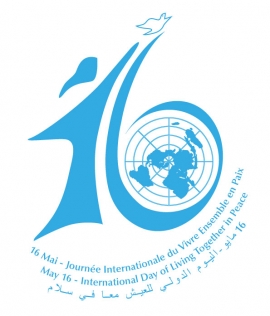
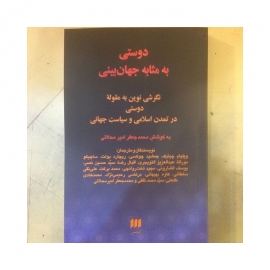
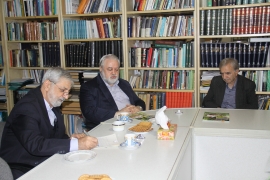
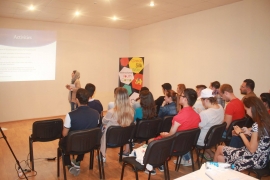
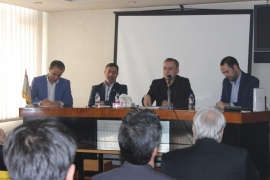
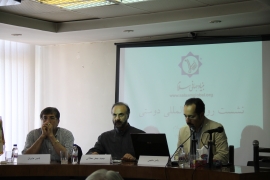
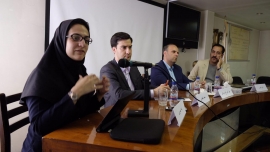
انجمن حامیان استاندارد